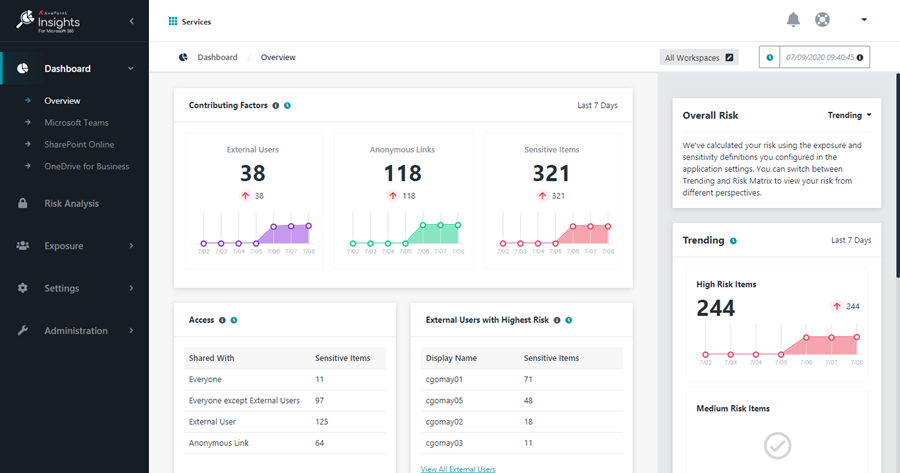Collaboration Risks: Why MSPs Must Deliver a Strong Security Solution

The convergence of technological innovation and transformative shifts in business dynamics are rapidly changing the way businesses operate: digital collaboration tools are now an even more integral part of daily operations. These tools allow teams to work together seamlessly despite increasingly remote or hybrid work setups.
However, this increased connectivity also opens the door to potential security risks. As more data is shared across platforms, the likelihood of sensitive information falling into the wrong hands increases. In 2023, 2,047 reported cybercrime incidents led to losing money or data, and the total cost of a data breach was nearly $4.5 million.
As a result, data security and data governance must be an integral part of any organization’s game plan, especially as more employees perform their jobs using Microsoft 365 and other digital collaboration platforms.
Many organizations look to trusted managed services providers (MSPs) to help them secure their collaboration in this new, modern workplace. How can MSPs meet this challenge?
Data Needs to Be ‘Buttoned Up,’ Not Just Backed Up
A comprehensive backup solution can provide a safety net, allowing organizations to restore data quickly and accurately – minimizing downtime and ensuring business continuity. But it should not end there. Organizations have a strong need for solutions that identify and reduce other risks in using Microsoft 365 for everyday work.
Case in point: AvePoint’s MSP survey shows that 35% of MSPs see a gap in their customers’ collaboration security. This also explains why data governance is at the top of MSP customers’ IT needs (69%) today. The absence of proper data governance tools can bring sprawl and chaos to Microsoft 365 quickly.
For example, when used out of the box, Microsoft Teams allows anyone to make Teams or channels as they see fit. Without proper governance and naming conventions, organizations can find themselves awash in duplicate Teams, as well as inconsistent site and channel names.
MSPs are now increasingly realizing the growing need for services that assist in collaboration, with 35% planning to add digital collaboration governance solutions. And now is the perfect time to do so. Nearly a third (29%) of MSPs currently offering such content collaboration and collaboration security services drove their revenue growth.

Deliver Proactive, Automated Security Configurations to Boost Your Value to Clients
MSPs can – and should – serve as the vanguard of their clients’ digital security, offering comprehensive solutions that protect businesses and enhance their operational efficiency. One important way to be this vanguard is through having a proactive approach to security. This involves monitoring systems for unusual activity, which could indicate a cyberattack. By detecting and responding to threats early, MSPs can minimize the damage caused by a breach.
Using systems that allow MSPs to identify who has access to sensitive data allows MSPs to define the risks of each company they handle and ensures that their most critical data are protected from unauthorized use.
MSPs can curb the risks associated with collaboration security with easy-to-use solutions such as AvePoint Policies, which provides a robust framework for managing and enforcing security policies across various collaboration platforms – including Microsoft 365. Meanwhile, AvePoint Insights provides actionable insights through detailed tenant-wide reports, helping MSPs and their clients mitigate the risks of data exposure and cyberattacks.
Take for example Custom365, a New Zealand-based MSP, which saves 100 hours of manual work a month by using AvePoint's Policies and Insights to manage risks in their clients’ Microsoft 365 environments. In one instance, Custom365 found through its use of Insights that one of its clients had over 35,000 anonymous shared links in a single Microsoft 365 tenant, which, if left unchecked, could create serious security issues for their data.

Policies helps with:
- Enforcing granular security policies. These policies can be customized to meet each client’s specific needs, ensuring that sensitive data is adequately protected. For instance, policies can be set to restrict access to specific files or folders, limit the sharing of sensitive data, or require multi-factor authentication for certain actions. It also enables recurring security and configuration services for Microsoft 365 and Microsoft Teams, which allows MSPs to “set it and forget it” when it comes to policies, permissions, and sharing controls of businesses.

insights helps with:
- Comprehensive reporting and analytics. Generate powerful insights to help MSPs and their clients understand their security posture and identify areas for improvement. For example, see which users are accessing sensitive data, which policies are being violated, and which security measures are most effective. This information can be used to refine security strategies and make informed decisions about security investments.
- Real-time monitoring and alerts. This proactive approach to security enables MSPs to detect and respond to potential threats promptly. An alert is triggered if unusual activity is detected, such as an unexpected data transfer or a sudden change in user behavior. This allows for immediate investigation and response, minimizing the potential damage of a security breach.
By facilitating this AvePoint service on businesses’ behalf, MSPs can add more value for their customers. MSPs may present clients with a personalized dashboard report from AvePoint’s Automated Risk Assessment tool to underscore the benefits of a third-party solution. In effect, MSPs can build an incremental monthly recurring revenue service for existing customers and prospects.
MSPs Must Provide Relief to Help Secure Collaboration
MSPs have a major opportunity to help their customers with collaboration security by integrating collaboration tools and security measures to maintain productivity while securely handling and sharing data.
Organizations must ensure that collaborative efforts do not compromise the integrity and confidentiality of the data. In addition, they must have a policy outlining the rules and regulations regarding data access, sharing, and storage. It should also define the roles and responsibilities of each team member in maintaining data security.
As experts, MSPs can develop and implement a comprehensive security strategy, including policies for data-handling and incident response. They can also train staff on cybersecurity best practices, such as recognizing phishing emails and using strong passwords. Moreover, MSPs can offer advice on the latest security technologies and trends. Their expertise can guide businesses in making informed decisions about their security investments.
This also represents a significant opportunity for MSPs to grow their business while ensuring ongoing collaboration needs will continue to challenge organizations that lack the resources to manage the increasingly large data volumes from various collaboration applications, such as Microsoft 365. MSPs can jump in and provide their expertise and known reliable solutions that can help businesses collaborate safely.
Learn more about our Partner Program for MSPs and how you can start making money in the collaboration security market.

Phoebe Magdirila is a Senior Content Marketing Specialist at AvePoint, covering SaaS management, backup, and governance. With a decade of technology journalism experience, Phoebe creates content to help businesses accelerate and manage their SaaS journey.



